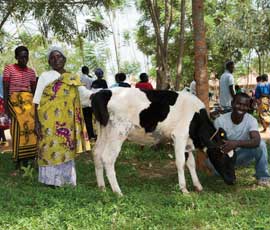Send A Cow celebrates 25 years of work in Africa

The charity Send a Cow is celebrating its 25th year and having transformed more than a million lives by its work in rural Africa. One of the founding farmers, who still works for the organisation today, David Bragg, tells the story.
Back in 1988, when dairy farmers like myself were being forced to put a lid on milk production, I learned of the serious drought Ugandan farmers were facing. I realised that one cow made a huge difference to a Ugandan family, while I could milk 200 cows and it wasn’t making an impact. So I called my peers, and together we came up with a solution: to send our own cows to Uganda to help those in need.
Although the initial aim was to provide milk to the malnourished, it soon became clear that the manure from the cows was even more beneficial, as it vastly helped to improve land and increase crop yields. Then followed our discovery that, by improving skills, both farmers’ confidence and community relations were improved.
These three strands – livestock, sustainable organic agriculture and social development – make up the three strands of our training programme. It is only by addressing all three that the roots of poverty can be truly addressed.
Send a Cow, based in Bath, grew from that first plane-load of dairy cows that arrived in Uganda 25 years ago. Now we work in seven African countries: Uganda, Rwanda, Kenya, Ethiopia, Burundi and Lesotho – now providing livestock sourced within Africa.
The farmers we meet in Africa struggle every day to feed their families from small plots of land, with degraded soils, a lack of skills, and all in the face on increasing climate shocks.
For them, the challenge can seem overwhelming, but really, the solution is simple. Send a Cow’s holistic approach is to train farmers to use what resources they have, in a sustainable way to ensure that their families and futures generations can get the most out of their land.
Our training is borne from what myself and the other founding farmers have learned from working the land, but most importantly, also from the successes of those we meet in Africa. Organic techniques such as mulching, composting and creating natural pesticides allow families to grow enough food to both eat and sell.
It was obvious from the start that the basic principles of good agriculture apply wherever you go. Animals need good management and soil needs to be fed as well as mined. Without reinvigorating the soil, whatever you do, you will not maximise your output. There might well be different resources in the UK and Africa, but the principles are still the same.
While we have seen a dramatic increase in mechanisation here in the UK, it merely allows us to do more with less labour. In Africa, where there is no shortage of manpower, expensive machines are not required.
It is possible to increase production significantly in Africa without going down the route of mechanisation, chemicals and GM. We regularly see that good principles and management lift yields by 300%. African smallholder farmers do not need large western inputs, rather they need organisations like Send a Cow to build skills and confidence.
Africa can feed itself – the resources are there. By teaching farmers to use the resources efficiently, and by using the local workforce – which in itself increases employment, a catalyst for change – organic farming is a sustainable solution to overcoming poverty.
The UK can itself learn lessons from our peers in Africa. Send a Cow always works with community groups, to ensure individuals get the support they need and build confidence. Farming in the UK has become a more isolated – and lonely – business. Farmers here don’t have that same network of peers to draw support and learn from.
A great challenge for us was when the BSE crisis hit – and livestock could no longer be exported from the UK to Africa. There was a perception that Send a Cow could no longer exist, but actually it just meant we had to adapt. We had already begun to purchase cows locally, but it accelerated a change in our thinking. We accelerated the use locally-purchased animals.
David’s farm
David has a 390 acre farm in mid-Devon. It is mostly well-drained but has some clay in the valleys. It is excellent for grass and forage production and reasonable for cereal production. He has intensive dairy livestock : 180 cows, a similar number of dairy followers and 50 beef animals for fattening. The farm also has 70-100 acres of barley and wheat.
Send a Cow implements a ‘Pass It On’ principle wherein a family gives its first female calf, or seeds or training to another family in need – creating a chain of assistance that will spread through communities and will be passed down through generations.
This year Send a Cow published its first impact report, which demonstrates just how far the effects of our work travel – from education through to health and livelihoods.
Ninety-seven per cent of the farmers that Send a Cow works with believe they can provide enough food and income for their families’ needs from their own land. By selling surplus farm produce, families’ income increases six-fold, taking them to well above the national average.
This extra income can then be used for medicine, improving their housing, investing in activities which help to diversify income, and to pay for education. In fact, three times as many children from families supported by Send a Cow are in secondary schools compared with the national average.
Education has the most emotional impact on me. I passionately wanted for my daughter to have equal opportunities with men. Now, I want to see it happen in Africa, and Send a Cow is helping achieve that.
And it can all begin with one cow.
